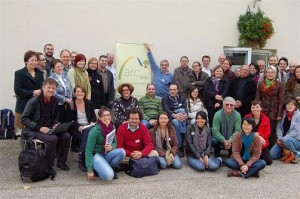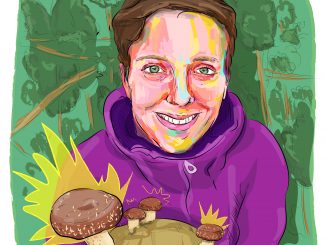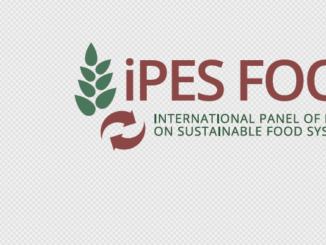
ARC: How would you describe Forum Synergies to people who don’t know you?
Simone Matouch: Forum Synergies (FS) is a European non-profit organisation. We gather, exchange, reinforce and spread sustainable practices, mainly in rural areas. Our network brings together citizens and associations engaged in local, sustainable experiences throughout Europe. Our network is a unique approach – connecting and valorizing rural experiences to develop more sustainable European countryside and policies. We are not about lobbying and simply carrying out projects, but about linking people and creating synergies.
ARC: Can you briefly outline the work of FS with regard to the reform of the CAP?
SM: Within our network we try to bring together people from diverse places across Europe. We motivate people to exchange their successes and needs. This leads to recommendations towards new European and local policy-making. Based on the deep understanding of what sustainable rural development can mean in reality we can offer proposals which go far beyond criticism. FS is one of the co-founders of the ARC process. We provided input from the local level which was taken up in the ARC Communication. We want to learn more about what the concrete CAP proposals would mean in local and regional projects. In our so-called Policy Shops we plan to visit rural areas in order to learn about how people are preparing for the new rural development and farm policy period.
ARC: How does Forum Synergies see the role of the ARC?

SM: The ARC process is an opportunity for our members and friends to get involved in policy making and to play a significant role in making good policies work on the local level. We learn a lot about other networks and movements and we feel enriched by the many individuals and organisations taking part in ARC debates and events. We have learnt a lot earlier with Terra Madre events of Slow Food, cooperation with Group de Bruges and others and are happy to discover that there a many people out there who share our concerns and visons. We support and promote the ARC process by bringing in the local perspective and sharing our methodological and practical experiences from our projects.
ARC: What are the key messages/concerns of Forum Synergies in the term of the CAP reform process?
SM: Let’s take a picture as an example – it arose during one of our workshops. “If EU programmes enter and leave rural areas like high speed trains, they increase the differences between the rich and the poor.” So the topic of increasing poverty is one of our concerns. We are also concerned about further disconnection between people living in rural and in urban regions. We think that policies for education and capacity building should give them more responsibilities and influence decision making. We plead for policies which preserve and create values beyond money. And we want to see states and enterprises put their money where sustainable practises and lifestyle grow, not where these are further systematically undermined.
Furthermore we are striving for a new approach to public health. Healthy food is at the very beginning of a healthy life. We want policy makers to take a fresh look at local knowledge in order to deal with the challenges of dwindling resources and increased demand for food. A broad access to local know-how which promotes public health is not a question of business but a priceless common treasure.
Farming and food, as well as land and natural resources, should not become hostage to speculation. They are essential elements of our European food, culture and biodiversity. We are calling for policies which stop land grabbing and speculation with food commodities. We reject exclusive rights on seeds or animal breeds such as patenting. Speculative investments of large companies are disconnecting farmers and communities from the land and food resources. We want policies which restore responsibility of land owners and land buyers to local communities.
The given examples just highlighted some of the topics we identified to be crucial. Learn more about our “messages from the countryside”, and have a look at the documents “Messages from Pierrerue” and “Message from Vouneuil”.
ARC: How did Forum Synergies to the CAP reform proposals released in October?
SM: We felt they contained a lot of good options. But they do not go far enough. We want agro-ecological systems as the basis of reform; they are still only very first steps in the right direction. And we need a lot more concrete elements which Member States must respect when planning for more sustainable rural development programmes.
ARC: What campaigns and events do you have coming up related to the CAP reform?
SM: As mentioned above, FS intends to organise a series of so-called Policy Shops to learn what the reaction and consequences on local level would be. We would very much appreciate if we could closely cooperate with the ARC team on that topic. Detailed information will be available at the beginning of next year!
Our website will be re-launched in January and will also include new elements as the “Splash-lights on rural reality” where our members and partners get the opportunity to share their visions and assessments for the future.




